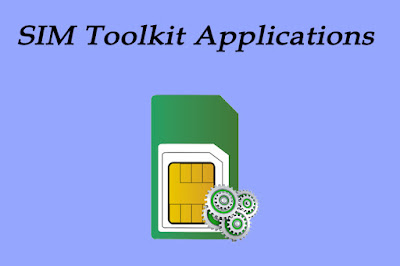The SIM Toolkit which is also known as
STK is a set of applications or commands which help in defining how the SIM
should interact with the outside world. The toolkit is mostly programmed inside
the SIM card and it helps in enabling the card to
- Driving the mobile equipment interface
- Help in building the interaction which happens between end user and network applications
- Control the access or provide the access to the network
There are
few common SIM Toolkit applications. They
are to display the text as instructed by services in the SIM Toolkit, playing
tones, ask for the user input, and launch applications like browser. This SIM
Toolkit is standard in all GSM systems. This toolkit comes with a set of commands
which are usually activated through network event or even by user actions. Mostly
the proactive commands are usually standard for all the mobile equipment and
they are defined by 3GPP and ETSI specifications.
 |
| Sim Toolkit |
The
standards even allow all the additional value-added services along with
functionalities which are to be integrated into the SIM card. These help in
providing customized user interface as well as menus to that particular mobile
handset.
The commands
given will help in enabling the SIM card to initiate further actions along with
allowing the users to get direct access for services. These services are
nothing but the ones provided by the mobile network operators. Along with these
services, they also get access to other services which are provided by banks,
utility companies, and even entertainment organizations.
Applications and SIM Toolkit
SIM Toolkit
always provides applications inside the SIM card which help in operating and
interacting with the compatible mobile device. Important thing to note here is
all the SIM Toolkit operations are independent of the phone design, phone make,
and even the manufacturer. These work as client-server, where understand the
SIM card applications as server side and phone as the client side.
STK is
actually implemented in 3 different layers.
- In first layer, RIL is implemented. That is low-level software which is provided by the vendor
- In the next layer, SIM Toolkit service is implemented. This is nothing but the simple machine code which helps in converting raw messages from RIL to the application-level messages
- Finally in the last layer, UI or user interface is implemented
There are
few functional categories into which these SIM Toolkit features are categorized
into. They are
- Miscellaneous
- Accessory management
- Application control
- Menu management
- Communication services
- Controlling entire user interface
The features
of SIM Toolkit fall into these major six functional categories. The UI
applications of the SIM Toolkit are actually protected by SIM pin or phone lock
pin. Sometimes they are even protected by both. So, whenever the phone is
locked, these applications will not be visible. When there is no SIM
application present in the SIM and even when there is no SIM card physically
present in the phone, the applications will not be visible.
The SIM
Toolkit or STK is used for Windows 10 and Android mobile operating systems. There
is equivalent SIM Toolkit Application
available for iPhone as well.
This comment has been removed by the author.
ReplyDeleteEmotion Spitfire SOT inflatable kayak is stable and tracks well in moderate water conditions. It features CRS and ultralite padded seat and padded backrest which offers tremendous comfort level while maneuvering.
ReplyDeletePerception Pescador Pro Sit On Top Kayak